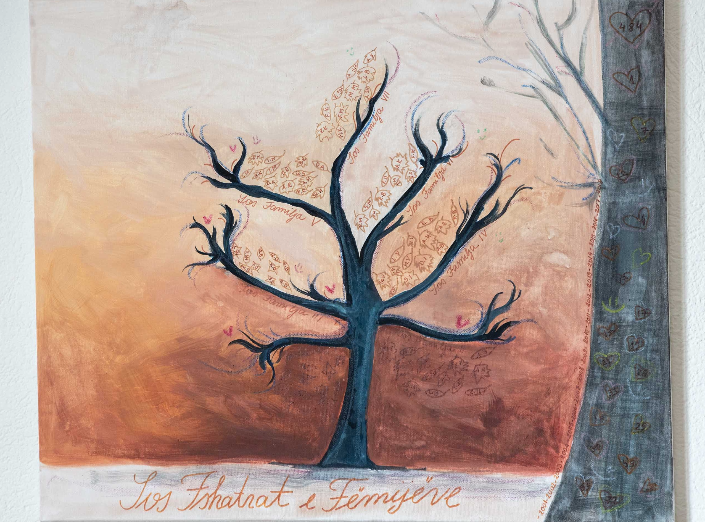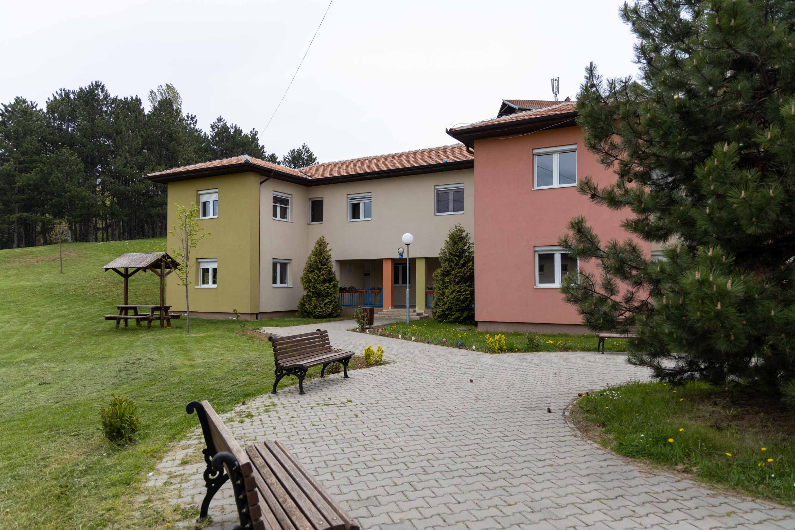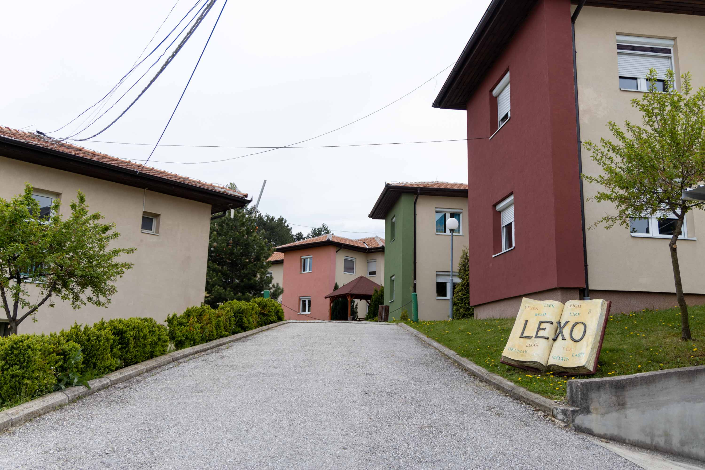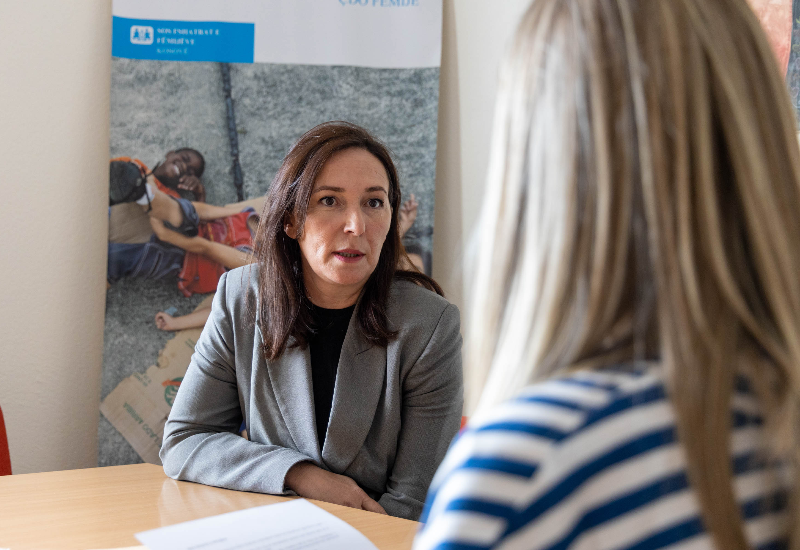Operating since 1999 as a non-governmental social care organization dedicated to supporting abandoned and needy children regardless of ethnicity, nationality, and religious belief, the SOS Children's Villages Foundation in Kosovo has already taken care of over 1,500 abandoned and needy children.
The foundation's mission is to create families for children in need and help them build their future while participating in their communities development. The main sources of funding for SOS Children's Villages are donations, sponsorships, donations of goods, and other services from all over the country.
Albana Zogu-Morina, Head of Fund Development and Communication, told everything about the mission, activities, and functioning in general of the SOS Children's Villages Foundation in Kosovo.
How was the SOS Children's Villages Foundation in Kosovo established, and how did it function during the first years?
Albana: The SOS Children's Villages Foundation was originally established in Imst, Austria, shortly after the end of World War II. As a result of the war, many children were left without parental care, and at that time, the founder of the foundation Herman Gmeiner, who grew up without parental care, thought that for those children, there should be a solution other than the orphanage style present at that time. The concept of the SOS Family was presented there for the first time, a family of a smaller group of children who have the care and love of the family. Meanwhile, SOS Children's Villages in Kosovo came immediately after the last war in 1999, initially as an emergency project. It functioned with two rental houses, with 24 babies each. In 2004, the first SOS Family was opened, and the first child was taken in, as his family could not care for him. Then in 2007, we also opened the Family Empowerment Program, aiming to prevent the loss of child care, which means that the families we work with and support provide them with psycho-social and health support, we support the education of their children, and we make efforts so that those children are not left without parental care, but grow up in the bosom of their families. We have been registered as a local foundation since 2009.
How do children come to SOS Villages? What types of care do they get?
Albana: All children without parental care who are part of the Alternative Care Program, namely SOS families, come to us through the Center for Social Work (CSW), which also has legal guardianship for all of them. We offer them full care, including housing, food, education, and well-being. We create families for children without parental care by employing an SOS Mother whose mission and work are truly noble.
Without hesitation, I always say that all the children growing up with us in SOS Families, in addition to the care, safety, and well-being, the SOS Mothers also give them love. We as staff can see it best. We also have cases when an SOS Mother or SOS Aunt has a birthday, and we can see that the children, on their initiative, celebrate their birthday in different ways, just as any child celebrates his/her mother's birthday or congratulates the March 8th, the Mother’s day. The maximum number of children an SOS Mother cares for is five. Children are not separated based on their age. Another aspect that we pay particular attention to is the cases where the children are biological siblings, and we do not separate them, as we think it is important for them to be together and to cultivate even more love for their siblings. Moreover, although these children are growing up with us, we constantly maintain contact with the family members that they might have, whether close or extended family members. We regularly send them to visit their family members, and from the beginning, we try to make them aware of their family roots.
SOS Children's Villages, in addition to the Alternative Care Program - SOS Families for children without parental care, also has a Family Empowerment Program. This program supports children at risk of losing parental care and their parents in Pristina, Graçanica, and Fushë Kosova. CSWs most often refer the families in the program. Through this program, we offer psycho-social services for children and their families, as well as support the family in the education of their children, the health of the family, but also the economic empowerment of the family.

How is the foundation funded?
Albana: SOS Children's Villages in Kosovo is partially funded by SOS Norway, our main funder. We get the rest of the funds from our country, starting from corporations, individuals, and even a part from the public funds, if not the smallest part.
We have long-term partnerships with various corporations, which have supported us continuously for years, either with postcards or other campaigns. They always respond to our invitations. Even the park, which is located in front of the SOS Villages, at our main office, is an investment of a corporation here in Kosovo, and they really take care of the maintenance of this part every year, fixing even the damaged toys.
In addition to the funds part, we have also developed the volunteering part. Certainly, considering that it is about children, there are some criteria that the volunteers must meet, such as completing the application and other documents. Volunteering is an important contribution to our organization. In the past, the volunteers were mainly engaged in the "Sun" project, taking care of the babies, since we had no other way to cover this project. Now volunteers are mainly involved in various activities. As an organization, we try to change and influence the dynamics of the family with the involvement of volunteers in activities, so their involvement is mainly organized in activities carried out within our programs without affecting the confidentiality and privacy of the children at any time. This is because children are the most important part of the organization.
In the past, but also now, we have had people who, through volunteer work, have contributed with English language courses for children, German language courses, music courses, training, and various extracurricular courses, which influence the development of children's skills that are part of our programs.
How are the funds accepted, and how is the community involved in your work?
Albana: As an organization, we are an example of fundraising, as we have some rules for accepting funds. In practice, these rules often penalize us; however, it was very important to have such criteria. For example, we do not accept funds from corporations that produce alcohol, from gambling businesses and tobacco businesses, for the sole reason that in many cases, these are considered to be the cause of family breakdowns. We, as an organization focusing on the child and his/her well-being, consider that we should not be associated with this group of corporations.
The other issue is that we do not accept cash. For any company that wants to donate, the transfer procedure must be done through the bank. Even for the companies or individuals who request a report on how their funds were spent, we provide such reports and relevant data.
By being transparent with the use of funds and using those funds for the intended purpose, I say that we help philanthropy in Kosovo. This increases the credibility of businesses and individuals to donate as much as possible.
Furthermore, we already have the community involved in our work. In addition to the volunteer part, we have agreements with universities, which constantly bring students to do their internships here. The community is even involved in other activities and different campaigns that we open to individuals. In other words, the community can be involved in all our activities since their direct involvement is part of our community awareness. On our social networks, we make all the announcements about the activities, while the volunteering part is also published on our website.

What are some of the challenges that the SOS Children's Villages in Kosovo are facing, and what do you consider a major success?
Albana: The issue of funds is our biggest challenge, and every year must be initiated from the beginning. As for the number of staff, there is always a need; however, currently, we are doing well since we manage the work with the volunteers and the interns we have. Regarding activism and volunteering, I can say that it is less challenging since we are the first ones to start with this form, and people already know enough about it.
When it comes to success, we are probably among the few organizations that need many years to achieve what we call success. If you ask me as Albana, the major success is that we have managed to change the lives of more than 1,500 children. We have influenced their lives to be better and their well-being to be better and dignified, whether within their family or even in SOS Family or after leaving alternative care. We have managed to have more than 30 children completely independent so far, and today the same ones are family members; they are parents, members, and contributors to this society. This is our greatest success.
What is your motivation for working in the non-profit sector? What are the advantages and challenges of being part of such a large and well-known foundation?
Albana: My biggest motivation is the fact that you have the opportunity to change someone's life and well-being, whether it is in the case of children, women, or any other group.
In organizations, you often have the opportunity to expand your knowledge and build your skills in different fields. Another part is the culture that organizations have, or our foundation, in particular, the organizational culture. Challenges are often countless in the NGO sector, either due to funding or other issues that may arise. The work I do as Head of Fund Development is very challenging. Sometimes when you contact many companies, and none of them is willing to contribute to a cause like the one of our foundation, it makes you very depressed and demotivates you. But on the other hand, this job fulfills me a lot. This is extremely fulfilling when you see the great work and the results achieved with children and families and the support we have from donors and volunteers who want to be part of our mission and cause.

This interview is made possible by the generous support of the American people through the United States Agency for International Development (USAID). The contents are the responsibility of Catalyst Balkans and do not necessarily reflect the views of USAID or the United States Government.
The Citizen Engagement Activity in Kosovo is a five-year initiative implemented by Kosovar Civil Society Foundation (KCSF) in partnership with the United States Agency for International Development (USAID).
Photo credits: Arbër Gjoni

Leave a comment